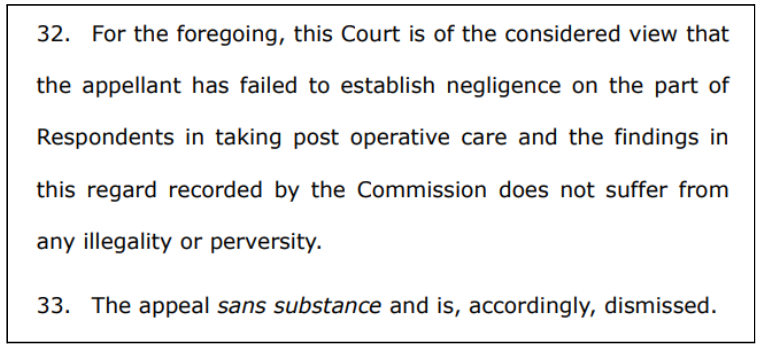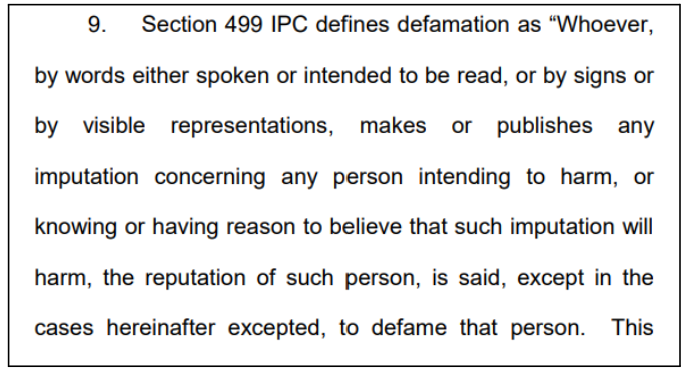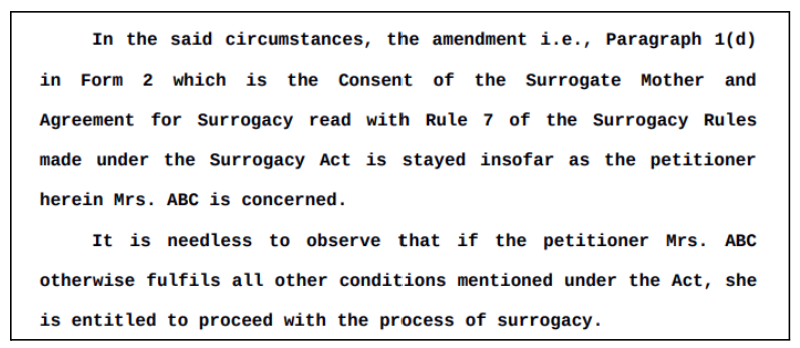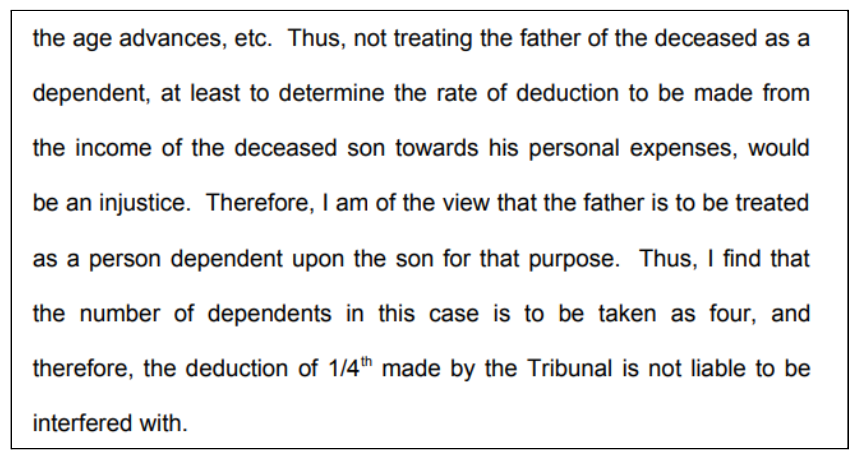In this week’s review of Court Judgments, we look Supreme Court’s observation that it is difficult for doctors to foresee potential cardiac problem if patient had no history of diabetes or hypertension, Kerala HC’s ruling that any criticism or loss of reputation of any product cannot be treated as defamatory, Kerala HC’s comments that fathers also look forward to support from children and may be treated as dependent, among others.
SC: It is difficult for doctors to foresee potential cardiac problem if patient had no history of diabetes or hypertension
In Kalyani Rajan vs. Indraprastha Apollo Hospital & Others, the complainant-appellant is the wife of the deceased patient who died in the hospital while undergoing follow-up care and treatment after a major neurosurgery. The deceased was suffering from Chiari Malformations (Type II) with Hydrocephalus, a neurological disease. They sought guidance from the Senior Consultant in the Department of Neurosurgery. Following their recommendation, the deceased was admitted, underwent pre-operative medical evaluations, and subsequently underwent surgery conducted by the aforementioned doctor. The deceased was then moved to a private room. He experienced neck pain that appeared to have shifted to a lower region compared to where it was experienced before the operation. The concern raised by the appellant was that, following the shift to a private room, the deceased did not receive any attention or care from a doctor belonging to the neurosurgery team that had previously conducted the operation on the deceased.
The issue before the apex court was whether the respondents committed negligence in not providing proper post-operative medical care to the patient. A bench of Justices A S Bopanna and Prashant Kumar Mishra observed that as per the standard practice, all patients who show no signs of complications in the recovery room and have no post or preoperative complications are sent to their rooms. Further, they observed that the heart attack suffered by the patient did not have any connection neither with the operation in question nor due to any negligent post-operative care. Moreover, the patient did not have any history of diabetes, hypertension, or any cardiac problem as a result of which it was difficult for the doctors to foresee heart attack, it added. The Court dismissed the appeal.

Kerala HC: Any criticism or loss of reputation of any product cannot be treated as defamatory
Ayub H H vs. State of Kerala is an appeal filed by the complainant in the Kerala High Court dissatisfied with the Magistrate’s decision. In the original case, the claim is that the respondent posted a defamatory comment about the complainant on a Facebook page. It is asserted that this Facebook post was created to tarnish the reputation of the complainant’s motor company. The alleged offenses were under Sections 500 (defamation), 501 (publishing defamatory material), and 502 (selling defamatory material) of the Indian Penal Code (IPC). The Additional Chief Judicial Magistrate in Ernakulam decided that there weren’t enough reasons to continue with the complaint and dismissed it.
The court reviewed Section 499 of the Indian Penal Code (IPC), which defines defamation as any statement or publication that harms an individual’s reputation through spoken or written words, signs, or visible representations. Referring to past judgement, the Court held that Section 499 IPC is regarding the harm to the reputation of any person. Any criticism or loss of reputation of any product cannot be treated as defamatory though it may not be of the liking of the manufacturers/producers. The Court dismissed the petition and refused to interfere with the order dismissing the complaint passed by the Additional Chief Judicial Magistrate.

SC: Woman allowed to undergo surrogacy by staying amendment
In the case, Arun Muthuvel vs. Union of India, the petitioners had challenged the amendment dated 14 March 2023 made to Form 2 under Rule 7 of the Surrogacy Rules, which is the form for Consent of the Surrogate Mother and Agreement for Surrogacy. The amendment states that donor eggs cannot be used for gestational surrogacy of an intending couple. She and her husband stated that they had completed the formalities for the procedure much before the Surrogacy Rules were amended to prohibit the use of donor eggs. There was no such bar when the couple had commenced with the procedure, the woman told the court.
The Court sought appropriate medical opinion and directed the concerned District Medical Board to certify whether the petitioners were in a position to produce oocytes (eggs) or not, due to Mayer-Rokitansky-Kuster-Hauser or MRKH syndrome. The condition causes absolute uterine factor infertility and the only way for a person suffering from such a condition to attain biological motherhood is through gestational surrogacy as they cannot produce their egg. The medical certificate noted the same.
A bench of Justice B V Nagarathna and Justice Ujjal Bhuyan allowed the woman to undergo surrogacy using a donor egg. However, it emphasized that the amendment has been stayed only in this case and that the Court is still considering the larger issue.

Kerala HC: Fathers also look forward to support from children and may be treated as dependent
In the case, New India Assurance Co. Ltd. Vs. Shymi & others, the Kerala High Court was considering an appeal against the award passed by the Motor Accident Claims Tribunal, Kollam, granting compensation amounting to Rs. 36 lakhs to the dependent wife, daughter, and parents of the deceased who lost his life in a motor accident. The Tribunal had fixed the deceased’s monthly income as Rs. 16,220. While the claimants sought enhancement of the compensation, the appellant filed the petition aggrieved by the quantum of compensation.
While calculating the compensation, the tribunal deducted a quarter of the monthly income, taking into account the number of dependents as four. According to the counsel for the appellant Insurance Company, the father of the deceased could not be included, as he could not have been treated as a dependent. Hence, according to the appellant, the proper deduction should have been one-third. Justice Ziyad Rahman A A observed that unless there is evidence to the contrary, the father is likely to have his own income, and he will not be considered as a dependent. The mother alone would be treated as the dependent.
He added that, there is nothing wrong in treating the father of the deceased as one of the dependents, at least for the purpose of determining the personal expenses of the deceased. Under normal circumstances, after the son’s marriage, he would spend more on his wife and children, and the father’s dependency on him would be limited. However, that alone would not make the father disentitled to be treated as one of the dependents. Further, noting that men also do crumble down and look forward to the support from their children for various reasons such as financial exigencies, physical and mental ailments, loss of earning capacity, etc., the compensation was reworked before disposing the case.

Kerala Consumer Court: Day Care Procedure was done as 24 hours Hospitalisation was avoided due to technological advancement & so the reimbursement cannot be denied
The case Johny Milton vs. Universal Sompo General Insurance Company Ltd dealt with the disbursal of medical insurance. The complainant’s mother was diagnosed with an eye problem for which she had to undergo treatment. They spent nearly Rs. 28,000 which was on ‘inpatient for a daycare treatment’. The insurance company argued that the treatment for the condition involved an Accentrix eye injection, which is an “outpatient procedure”.
The Consumer Commission in Kerala observed that under guidelines issued by the Insurance Regulatory and Development Authority of India (IRDAI), “Intravitreal injections” were included in health insurance policies and that the company was denying the insurance on false grounds. Further, it noted that the patient was discharged on the same day due to advanced technology and infrastructure, which otherwise would have otherwise required hospitalization for more than 24 hours. The court also observed that the insurance company had cleared a similar claim despite being aware of the policyholder’s complaint. The commission asked the company to reimburse the expenses of the complainant and also pay Rs. 20,000 as compensation for the deficiency of service & mental agony.



